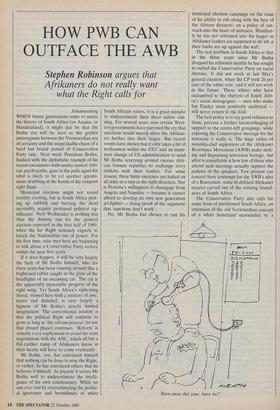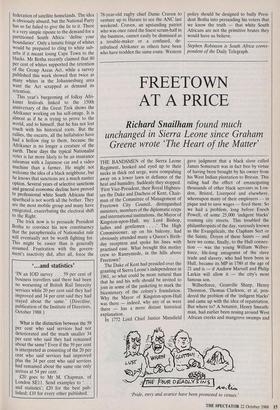HOW PWB CAN OUTFACE THE AWB
Stephen Robinson argues that
Afrikaners do not really want what the Right calls for
Johannesburg WHEN future generations come to assess the history of South Africa (or Azania, or Mandelaland), it might just be that the Botha era will be seen as the golden interregnum between the Verwoerdian era of certainty and the unspeakable chaos of a brief but brutal period of Conservative Party rule. Next week President Botha, flushed with the diplomatic triumph of his recent encounters with sundry central Afri- can psychopaths, goes to the polls again for what is likely to be yet another ignomi- nious drubbing at the hands of his rampant right flank.
Municipal elections might not sound terribly exciting, but in South Africa pick- ing up rubbish and burying the dead inevitably acquire profound political sig- nificance. Next Wednesday is nothing less than the dummy run for the general election expected in the first half of 1989, when the far Right seriously expects to knock the Nationalists out of power. For the first time, wise men here are beginning to talk about a Conservative Party victory within the next five years.
If it does happen, it will be very largely the fault of Mr Botha himself, who for three years has been running around like a frightened rabbit caught in the glare of the headlights of an oncoming car. The car is the apparently inexorable progress of the right wing. Yet South Africa's right-wing threat, viewed here with a mixture of awe, terror and disbelief, is very largely a figment of Mr Botha's strictly limited imagination. The conventional wisdom is that the political Right will continue to grow so long as 'the reform process' (to use that absurd phase) continues. 'Reform' is actually a coy euphemism to avoid the term negotiations with the ANC, which all but a flat-earther rump of Afrikaners know in their hearts will have to come eventually.
Mr Botha, too, has convinced himself that nothing can be done to stop the Right, or rather, he has convinced others that he believes it himself. At present it serves Mr Botha well to underestimate the intelli- gence of his own constituency. While no one ever lost by overestimating the politic- al ignorance and boorishness of white South African voters, it is a great mistake to underestimate their sheer native cun- ning. For several years now certain West- ern governments have parroted the cry that sanctions would merely drive the Afrikan- ers further into their laager. But recent events have shown that it only takes a bit of restlessness within the EEC and an immi- nent change of US administration to send Mr Botha scurrying around various Afri- can banana republics to exchange ivory trinkets with their leaders. For some reason, these futile exercises are hailed on all sides as a step in the right direction. Nor is Pretoria's willingness to disengage from Angola and Namibia — because it cannot afford to develop its own new generation jet-fighter — living proof of the argument that 'sanctions don't work'.
No, Mr Botha has chosen to run his municipal election campaign on the issue of his ability to rub along with the best of the African dictators, on a policy of out- reach into the heart of darkness. Manifest- ly he has not retreated into his laager as Afrikaner leaders are supposed to do wh ..n their backs are up against the wall.
The real problem in South Africa is that in the three years since Mr Botha dropped his reformist mantle he has sought to outbid the Conservative Party on racial rhetoric. It did not work at last May's general election, when the CP took 26 per cent of the white vote, and it will not work in the future. Those whites who have succumbed to the rhetoric of South Afri- ca's racial demagogues — men who make Ian Paisley seem positively analytical will never return to the fold.
The best policy is to say good riddance to them, prevent a further haemorrhaging of support to the centre-left groupings, while exposing the Conservative message for the nonsense it really is. The huge rallies of swastika-clad supporters of the Afrikaner Resistance Movement (AWB) make strik- ing and depressing television footage, but what is remarkable is how few of those who attend such meetings actually support the policies of the speakers. Few present can conceal their contempt for the SWB's idea of a Boerestaat, some ill-defined Afrikaner statelet carved out of the existing bound- aries of South Africa.
The Conservative Party also calls for some form of partitioned South Africa, an extension of the old Verwoerdian concept of a white homeland surrounded by a `Been away this year, have we?' federation of satellite homelands. The idea is obviously absurd, but the National Party has so far failed to give the lie to it. There is a very simple riposte to the demand for a partitioned South Africa: 'define your boundaries'. Only a lunatic fringe of whites would be prepared to cling to white sub- urbs if it meant losing Cape Town to the blacks. Mr Botha recently claimed that 80 per cent of whites supported the retention of the Group Areas Act, while a survey published this week showed that twice as many whites in the Johannesburg area want the Act scrapped as demand its retention.
This year's burgeoning of folksy Afri- kaner festivals linked to the 150th anniversary of the Great Trek shows the Afrikaner working on his self-image. It is almost as if he is trying to prove to the world, and to himself, that he has not lost touch with his historical roots. But the rallies, the oxcarts, all the hullabaloo have had a hollow ring to them, because the Afrikaner is no longer a creature of the earth. These days the typical Nationalist voter is far more likely to be an insurance salesman with a Japanese car and a video machine than a farmer. He might not welcome the idea of a black neighbour, but he knows that sanctions are a much nastier option. Several years of selective sanctions and general economic decline have proved to professional white South Africans that apartheid is not worth all the bother. They are the most mobile group and many have emigrated, exacerbating the electoral shift to the Right.
The trick now is to persuade President Botha to convince his new constituency that the paraphernalia of Nationalist rule will eventually not be worth fighting for. This might be easier than is generally assumed. Frustration with the govern- ment's inactivity did, after all, force the
78-year-old rugby chief Danie Craven to venture up to Harare to see the ANC last weekend. Craven, an upstanding patriot who was once rated the finest scrum-half in the business, cannot easily be dismissed as a trouble-maker or a confused, de- tribalised Afrikaner as others have been who have trodden the same route. Western policy should be designed to bully Presi- dent Botha into persuading his voters that we know the truth — that white South Africans are not the primitive brutes they would have us believe.
Stephen Robinson is South Africa corres- pondent of the Daily Telegraph.



































































 Previous page
Previous page